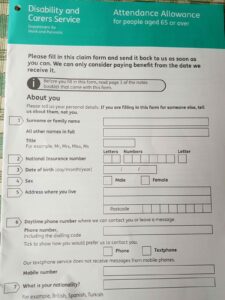The ‘Lifetime Cap on Care Fees’ proposed from Oct 2023 will be delayed until 2025
The government’s plans to limit how much an individual in England will pay for their own social care have been delayed by two years.
In the Autumn Statement (17th November 2022), chancellor Jeremy Hunt said the cap will now come into effect in 2025.
The reforms were first outlined in September 2021 by then-prime minister Boris Johnson, and were due to come into effect in October 2023
How will this affect you and your loved one? If you are paying for care, do you need to do anything and when?
“Wow! From beginning to end you helped me to understand what was happening, get the right assessments, find a care home and claim benefits that I didn’t know existed. I can’t thank you enough”. LK – Towcester
Will the cap on care fees affect me?
Proposals to introduce a cap on care fees from October 2023, have been delayed until 2025. The government intends to introduce a new £86,000 cap on the amount anyone in England will need to spend on their personal care (not daily living) over their lifetime.
Extended Means Test
- £100’000+ (currently £23’250) – You will be a ‘Self – Funder, able to pay for your own care.
- £20’000 – £100’000 – A tariff income of £1 for every £250 is applied during a financial assessment
- Below £20’000 (currently £14’250) – Only your income will be financially assessed
Daily Living Costs
The term ‘personal care costs’ refers only to the components of any care package considered to be related to personal care, not hotel and accommodation costs. The cap will not cover the daily living costs (DLCs) for people in care homes, and people will remain responsible for their daily living costs throughout their care journey, including after they reach the cap. For simplicity, these costs will be set at a national, notional amount, the equivalent of £200 per week in 2021 to 2022 prices
How will you progress towards the cap? Your Personal (or Independent) Personal Budget
Who chooses my care?
Once the cap has been reached
Once the cap has been reached, the person will continue to remain responsible for meeting or contributing to their daily living costs and any top-up payments they have chosen to make. It will be the responsibility of the local authority to inform the person that they have reached the cap.
Do I need to do anything?
Even if you are paying towards or the full cost of your care you can request a Care Act assessment from your Local Authority and a Care Funding and Benefit Check will help you understand the ways to pay for care and make sure you are claiming your benefit enetitlement.
If you would like some help please Get In Touch.
Care Navigators
(September 2022 – updated Nov 2022)








